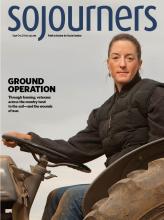IT’S A MAY evening on the farm. My husband’s planting tomatoes and our son needs a bedtime story, but I’m completely occupied with pictures of war. I’ve cleared the piles of laundry from the kitchen table so our friend Adam can spread out his albums. There are photos of Adam in his tidy platform tent, of brown mountains in the distance, and dozens of pictures of children grinning on the other side of razor wire.
“This is an Aardvark,” he says, pointing to a gargantuan armored vehicle as he describes the flails that detonate buried mines. “What does that do to the soil?” I ask, because this is what you wonder when you and your family have been Mennonite farmers since the Reformation. There are a few more photos before I finally get it. Adam is showing me Bagram Air Base, the U.S. military hub in Afghanistan, surrounded by minefields and littered with burned-out tanks and planes, the wreckage of war from the Soviets. No one farms here, or has, or will for a long, long time.
FOR THE PAST three seasons, Adam McDermott has come to our farm in Central Pennsylvania’s Stone Valley every Friday morning to harvest vegetables for the food bank. We always chat while we bunch beets or pick green beans, and now I wonder why we’ve never talked about his years in the Army.
“This farm has definitely been part of my therapy,” he tells me, while offering a brief sketch of his months in Iraq: taking heavy equipment down unfamiliar roads to set off hidden explosives, being promoted to sergeant, and then losing three friends when a bomb shattered their Humvee. Adam came home in 2008 with Post-Traumatic Stress Disorder (PTSD) and an alcohol addiction. “A lot of guys struggle with alcohol,” Adam says. “In the military you have camaraderie and a sense of purpose. But when you get back, there’s just this big void.”
Read the Full Article
